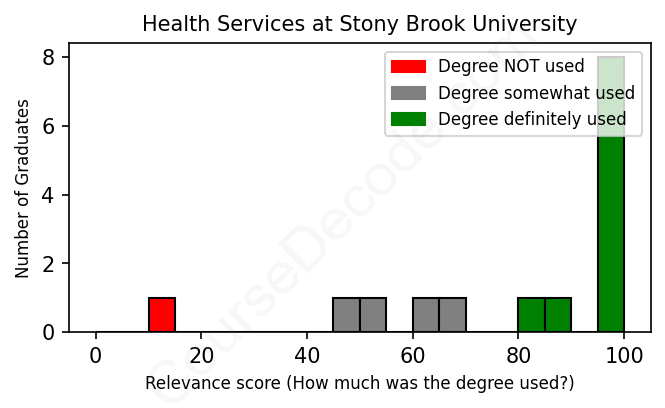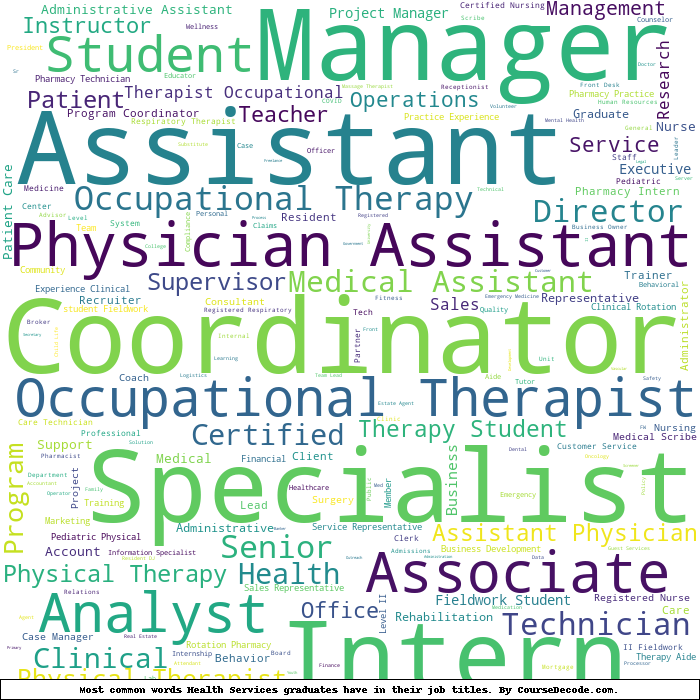
First, some facts. Of the Health Services graduates from Stony Brook University we've analyzed , here's how many have used (or NOT used) their degree in their career:

These are estimates based on AI analysis of 15 LinkedIn profiles (see below).
The verdict? Significantly above average. Overall, with an average relevance score of 80%, Health Services graduates from Stony Brook University have a much higher likelihood (+13%) of finding work in this field compared to the average graduate across all fields:
And for comparison, here's the chart for all profiles we've looked at across all degrees.
Also, after graduating, 60% of these graduates have pursued further education other than another Bachelor's degree (such as a Masters degree or other), compared to the average across all profiles of 35%. This suggests you may need more than just a Bachelors degree to be competitive as a Health Services graduate.
See the details:
|
Relevance score: 100% We think this person has gone into a career highly relevant to their degree. We think this person has gone into a career highly relevant to their degree.
DEGREE INFOGraduated in 2014 from Stony Brook University with a Bachelor of Science - BS in Health Services. Also pursued further education since (see below). JOB HISTORY SINCE GRADUATIONIntern Pharmacist Providence St. John's Health Center Jul 2015 - Dec 2018 Compounding Pharmacist  Hartley Medical Center Pharmacy Nov 2018 - Nov 2019 Inpatient Pharmacist  St. Francis Medical Center Dec 2019 - May 2020 Vaccine Pharmacist  986 Pharmacy Aug 2021 - Sep 2021 Vaccine Pharmacist  University of Southern California Dec 2020 - Dec 2021 FURTHER DEGREES DONE SINCE GRADUATINGDoctor of Pharmacy - PharmDUniversity of Southern California 2014 - 2018 ABOUTNo information provided. |
The top 10 most common jobs done by the graduates we've analyzed (ranked most common to least) are:
Based on the LinkedIn profiles of graduates from Stony Brook University with a degree in Health Services, it's clear that many of them have pursued careers closely aligned with healthcare roles. A significant number have become Physician Assistants or have taken on similar positions in hospitals and healthcare systems. These roles, such as Surgical Physician Assistant or Clinical Systems Analyst, require strong medical knowledge and hands-on patient care, directly utilizing the foundational skills learned in their Health Services degree. It's impressive how these graduates have transitioned into essential roles within the healthcare field, indicating that their education prepares them well for these responsibilities.
However, there are also some graduates who have taken on roles that aren't as directly related to Health Services. Positions like Medical Records Clerk or Administrative Assistant don't necessarily require the same level of expertise as clinical roles, even if they might involve some relevant skills. Others have branched into areas like business analysis or digital engagement, where the connection to their degree is more abstract. Overall, while many jobs are highly relevant to Health Services, there's a mix of roles—some aligning perfectly with their studies, while others take a bit of a detour. But all in all, it seems like the degree provides a solid springboard for a variety of career paths in the health sector and beyond!
Here is a visual representation of the most common words in job titles for Health Services graduates (this is across all Health Services graduates we've analyzed, not just those who went to Stony Brook University):

Graduates from the Health Services program at Stony Brook University seem to have pretty exciting career trajectories, especially in the healthcare sector. Many of them land their first jobs in positions directly related to health services, like Physician Assistants or roles in hospital administration. For example, graduates from 2010 went on to work as Physician Assistants at major healthcare facilities like New York Presbyterian and Johns Hopkins, kicking off their careers in a hands-on healthcare environment right after completing their studies. This trend continues with graduates from 2012 and 2014 holding significant positions such as Surgical Physician Assistants and Site Managers, proving that initial roles often translate into solid, long-term career paths in health services.
As we look ahead five to ten years after graduation, it appears that many of these alumni are climbing the ranks and expanding their skill sets within the healthcare field. It’s common to see them transitioning into more specialized or leadership roles, like Surgical Critical Care Physician Assistants or Clinical Systems Analysts. The variety in job titles also indicates that graduates are not just sticking to one path but exploring different areas within health services and health informatics. However, a few have taken more unexpected paths, venturing into roles that are somewhat tangential to health services, like HR managers or business analysts, which shows that while many do remain within healthcare, others are finding interesting niches beyond the clinical side. Overall, it seems like Stony Brook graduates are on a solid track toward fulfilling and relevant careers in health services and related fields!
Getting a Bachelor’s degree in Health Services at Stony Brook University can be a bit of a mixed bag, depending on what you’re bringing to the table. Generally, it’s considered to be a moderate difficulty degree—it's not as intense as something like pre-med, but it still requires a solid understanding of concepts in health care systems, policy, and administration. You’ll probably have to tackle some group projects, presentations, and maybe an internship or two, which can spice things up. If you're organized, can handle deadlines, and are willing to put in the effort, you'll likely find it pretty manageable. Just be prepared to engage with some real-world healthcare issues—it’s a balance of theory and practical application!
Most commonly, in the LinkedIn profiles we've looked at, it takes people 4 years to finish a Bachelor degree in Health Services.
Looking at these Stony Brook University Health Services graduates, it's clear that many of them have landed pretty good jobs within a few years of graduating, especially those in medical roles like Physician Assistants and Nurses. Positions at reputable hospitals like New York Presbyterian and Johns Hopkins typically come with solid salaries. However, some of the roles, like administrative or IT positions, might not pay as much initially but can lead to better opportunities down the line. Overall, it seems like most of these grads are doing quite well, especially in the medical and technical fields, giving them a decent shot at making good money over their careers.
Here is a visual representation of the most common words seen in the "about" section of LinkedIn profiles who have a Bachelor degree in Health Services (this is across all Health Services graduates we've analyzed, not just those who went to Stony Brook University). This may or may not be useful:

Here are all colleges offering a Bachelor degree in Health Services (ordered by the average relevance score of their Health Services graduates, best to worst) where we have analyzed at least 10 of their graduates:
| College | Score | Count |
|---|---|---|
 The Ohio State University The Ohio State University
|
88 | 14 |
 Quinnipiac University Quinnipiac University
|
88 | 10 |
 Grand Valley State University Grand Valley State University
|
87 | 16 |
 University of Tampa University of Tampa
|
87 | 10 |
 Stony Brook University Stony Brook University
|
80 | 15 |
 Boston University Boston University
|
79 | 12 |
 University of Connecticut University of Connecticut
|
78 | 26 |
 Florida Agricultural and Mechanical University Florida Agricultural and Mechanical University
|
76 | 12 |
 Texas A&M University Texas A&M University
|
72 | 16 |
 University of South Florida University of South Florida
|
72 | 26 |
 Boise State University Boise State University
|
71 | 11 |
 University of Central Florida University of Central Florida
|
68 | 47 |
 Florida Gulf Coast University Florida Gulf Coast University
|
68 | 10 |
 James Madison University James Madison University
|
66 | 26 |
 University of Missouri-Columbia University of Missouri-Columbia
|
66 | 17 |
 California State University, Fullerton California State University, Fullerton
|
66 | 13 |
 California State University - East Bay California State University - East Bay
|
66 | 10 |
 Arizona State University Arizona State University
|
62 | 10 |
 Cleveland State University Cleveland State University
|
60 | 10 |
 Stockton University Stockton University
|
58 | 12 |